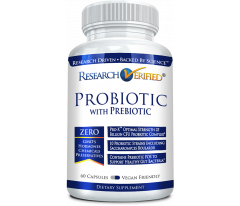We all know that feeling of discomfort in our stomachs that can’t be attributed to a specific cause. Oftentimes, this is a sign that something isn’t quite right with our gut health. If you’re experiencing ongoing digestive problems, such as bloating, gas, diarrhea, or constipation, it may be time to look into taking a probiotic supplement. However, gut health also affects the rest of our body, meaning that there are additional signs to look out for. In this blog post, we’ll discuss the signs you need a probiotic and how to tell when it’s time to invest in a probiotic supplement.
What Are Probiotics And What Do They Do?
Probiotics are live microorganisms that can provide health benefits when consumed in adequate amounts. They are often referred to as “good bacteria” and can be found in certain foods, such as yogurt, kefir, sauerkraut, and kimchi, as well as nutritional supplements.
The most commonly studied probiotic strains include Lactobacillus and Bifidobacterium. These strains can help maintain a healthy balance of gut bacteria, which is important for proper digestion, nutrient absorption, and immune function.
Probiotics have also been shown to have a positive impact on other areas of health, including mental health and skin health. They may help reduce symptoms of anxiety and depression, improve the skin’s natural barrier function, and even reduce the severity of allergies.
But how do you know that your gut is in need of these beneficial bacteria? Here are some signs that you should start taking a probiotic supplement.
5 Signs You Need A Probiotic Supplement
1. Frequent Abdominal Pain Or Bloating

One of the most common reasons people take probiotics is because they’re experiencing digestive problems. These issues can manifest in a number of ways, including bloating, gas, diarrhea, constipation, or general discomfort after eating. If you’re experiencing any of these symptoms on a regular basis, it’s a good indication that your gut microbiome may be out of balance and could benefit from the addition of probiotics.
There are a few different reasons why your gut health might be off-kilter, but some of the most common causes include a poor diet, stress, antibiotic use, or underlying health conditions like IBS or celiac disease. Probiotics can help to replenish the beneficial bacteria in your gut that may have been lost due to these factors, and can improve your overall digestive health as a result.
If you’ve been struggling with persistent digestive issues for some time, it’s a good idea to talk to your doctor or a registered dietitian to see if probiotics might be a good addition to your treatment plan. They can help you identify any underlying causes of your symptoms and recommend the best probiotic supplements for your specific needs.
Always Bloated? Maybe Your Gut Is Telling You something…
2. Chronic Fatigue
Do you find yourself feeling tired even after a good night’s sleep? Does it seem like you just can’t muster the energy to get through the day? If so, your gut may be trying to tell you something.
Unexplained fatigue can be a sign that your body is struggling with imbalanced gut bacteria. Probiotics are designed to help restore balance to your gut microbiome, which can lead to improved energy levels and a stronger immune system.
There is mounting evidence that gut health is directly linked to fatigue and low energy levels (1). In fact, studies have shown that supplementing with probiotics can lead to improved energy and even reduced symptoms of depression and anxiety (2).
So, if you find yourself constantly feeling sluggish and run down, it may be time to consider taking a probiotic supplement. Of course, it’s always a good idea to talk to your doctor first to make sure there aren’t any underlying health issues causing your fatigue.
3. Brain Fog
Do you feel like you’re in a constant state of mental haze? If you’re struggling to concentrate, remember important information, or just generally feel like your mind is foggy, you could benefit from taking a probiotic supplement.

Recent studies have linked the health of your gut to your cognitive function, including your ability to focus and recall information (3). When your gut is unhealthy, it can create inflammation throughout your body, including in your brain.
Probiotics can help to reduce inflammation in your gut, which in turn can improve cognitive function. Additionally, certain strains of probiotics have been shown to directly benefit the brain, including boosting serotonin production (which can improve mood) and reducing anxiety.
If you’ve been experiencing brain fog and have ruled out other potential causes (such as stress or lack of sleep), it’s worth trying a probiotic supplement to see if it can help improve your cognitive function.
4. Antibiotics
Antibiotics are a powerful tool that helps to fight bacterial infections. While they are great for helping to cure an infection, they can also wreak havoc on the gut microbiome. Antibiotics do not discriminate between good and bad bacteria, and they can wipe out all of the beneficial bacteria in your gut that help with digestion and overall health.
If you find yourself on antibiotics, you may want to ask your doctor about taking a probiotic supplement to replenish the beneficial bacteria that are lost during antibiotic treatment.
If your doctor gives you the green light to take a probiotic, it’s important to note that you should wait a few hours after taking antibiotics before taking a probiotic. Antibiotics can kill the beneficial bacteria in a probiotic supplement, so it’s best to wait until the antibiotic has had time to work before taking a probiotic supplement.
Additionally, you may want to consider taking a probiotic supplement for a few weeks after finishing your course of antibiotics. This can help to replenish the beneficial bacteria in your gut and improve your overall gut health.
5. Weak Immune System
If you’re someone who frequently gets sick or suffers from allergies, you may be able to improve your immune system with probiotics. Probiotics have been shown to help with immunomodulation and inflammation (4).
Studies have found that certain strains of probiotics, such as Lactobacillus and Bifidobacterium, may help reduce the frequency and severity of respiratory infections, urinary tract infections, and even some gastrointestinal infections (5).

It’s important to note that while probiotics can certainly help support a healthy immune system, they are not a cure-all for all immune-related issues. If you have a serious autoimmune disorder or a compromised immune system, you should speak with a medical professional before taking any kind of supplement.
That being said, if you’re someone who just seems to catch every cold that goes around, taking a probiotic supplement may be worth considering as a way to give your immune system a little extra support. As always, be sure to choose a high-quality supplement that contains strains that have been shown to support immune function, and follow the manufacturer’s recommended dosage guidelines.
Finding The Best Probiotic Supplement
It’s important to note that not all probiotics are created equal. The strain, dosage, and delivery method (such as capsules, powders, or foods) can all impact the effectiveness of a probiotic supplement.
When looking for a high-quality probiotic supplement to improve your overall well-being, look for a supplement with a variety of probiotic strains. Each strain of probiotic provides unique health benefits and supports the body in different ways. Because the Lactobacillus and Bifidobacterium strains are the most studied, check the label to see if these highly beneficial strains are included in the product. Additionally, you want to find a probiotic supplement that contains a prebiotic, as this will help the probiotics to colonize and flourish in your gut. You also want to see a high colony forming unit (CFU) listed on the label.
For example, Research Verified Probiotic provides at least 25 billion CFU. It contains 10 different types of probiotics, 9 of which are Lactobacillus or Bifidobacterium strains. Additionally, this supplement contains prebiotic FOS (Fructooligosaccharides) to support the growth of the healthy bacteria.
After checking the label of a probiotic supplement, make sure to check the company’s reputation. This will help to ensure that the pills actually contain what they say on the label. Make sure the manufacturer follows the GMP guidelines, upholds the standards of the US Pharmacopeia, and has third-party testing done on their ingredients. Lastly, keep an eye out for a money-back guarantee as those display whether or not the manufacturer stands behind their product. Research Verified meets all these standards and has an unprecedented 365-day money back guarantee.
Conclusion
If you experience any of the 5 signs discussed above (frequent abdominal pain or bloating, chronic fatigue, brain fog, antibiotic use, weak immune system), it’s time to talk to your doctor about adding a probiotic supplement to your diet. Be proactive about your health today and try out Research Verified Probiotic.




